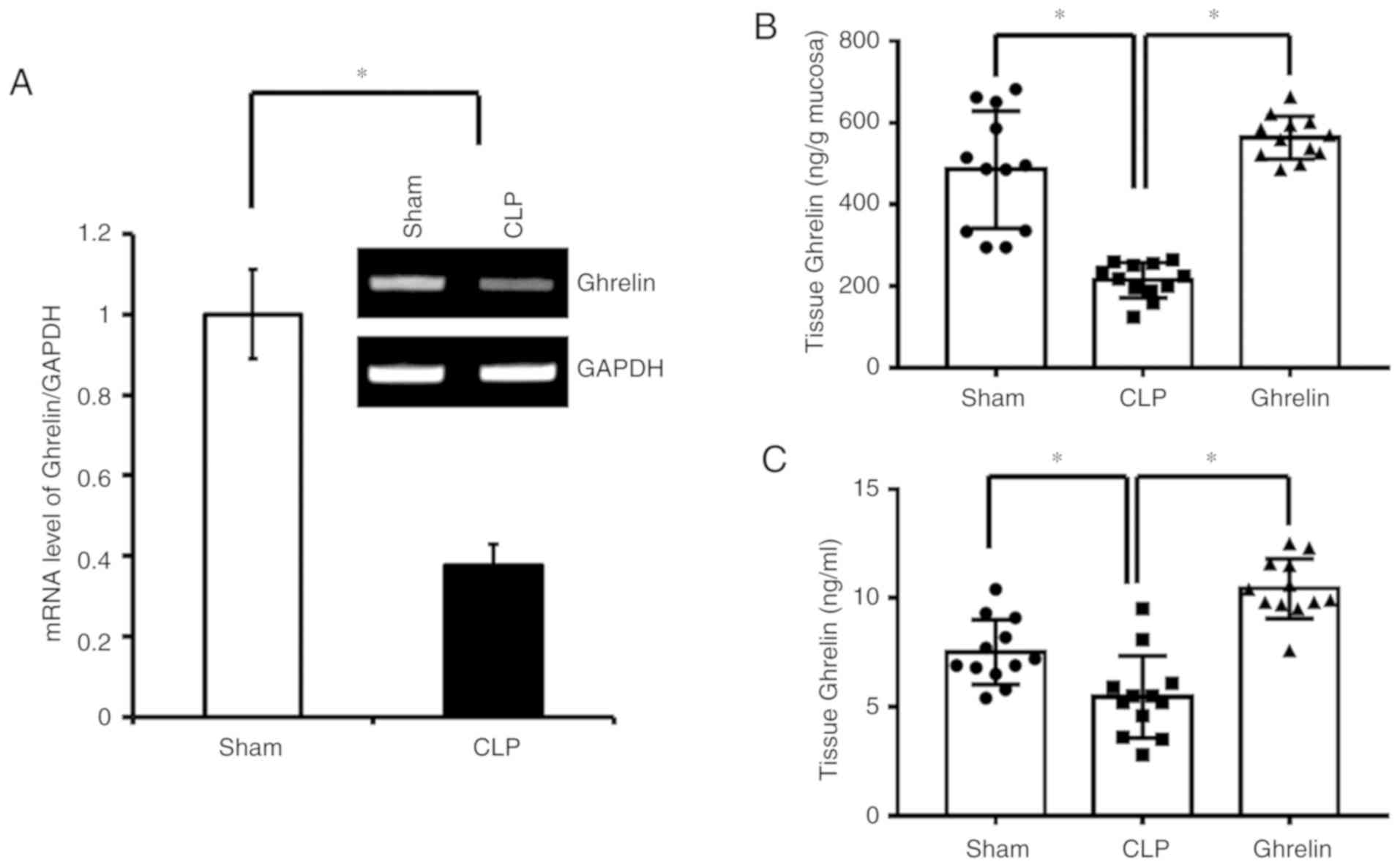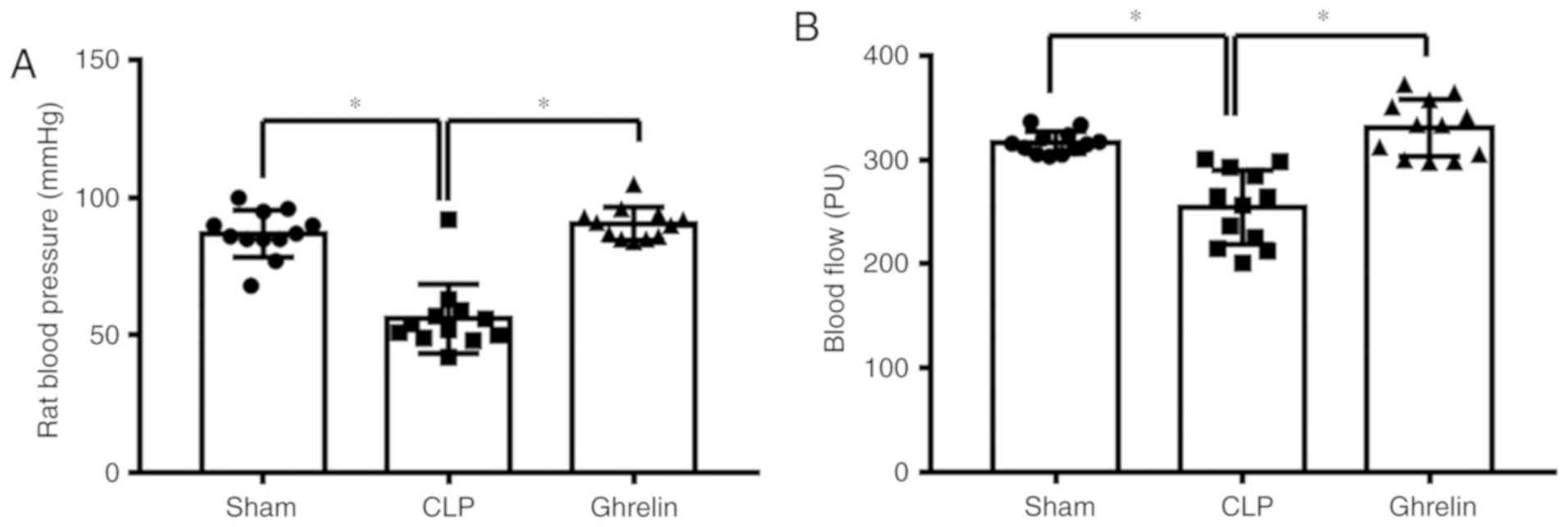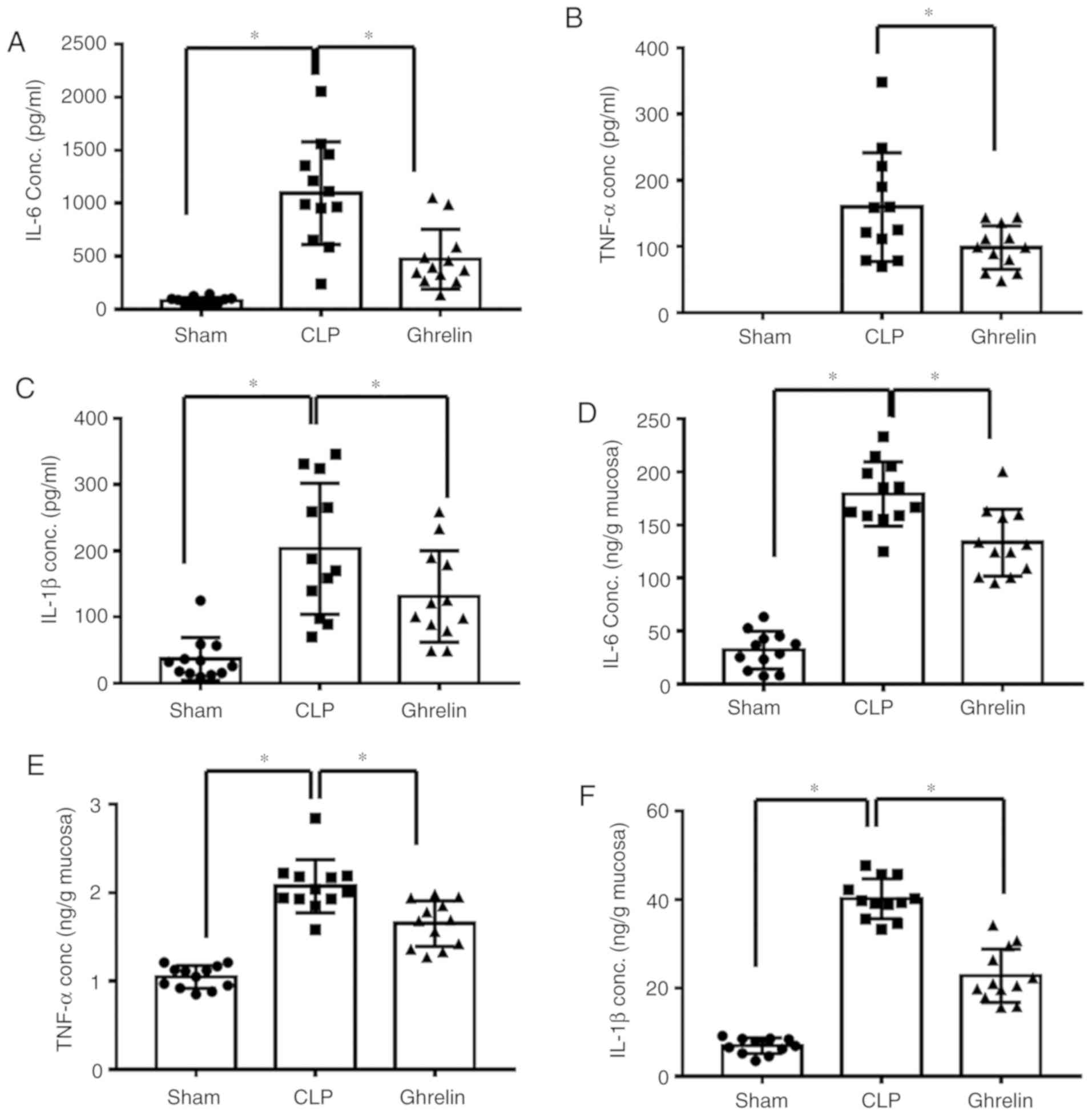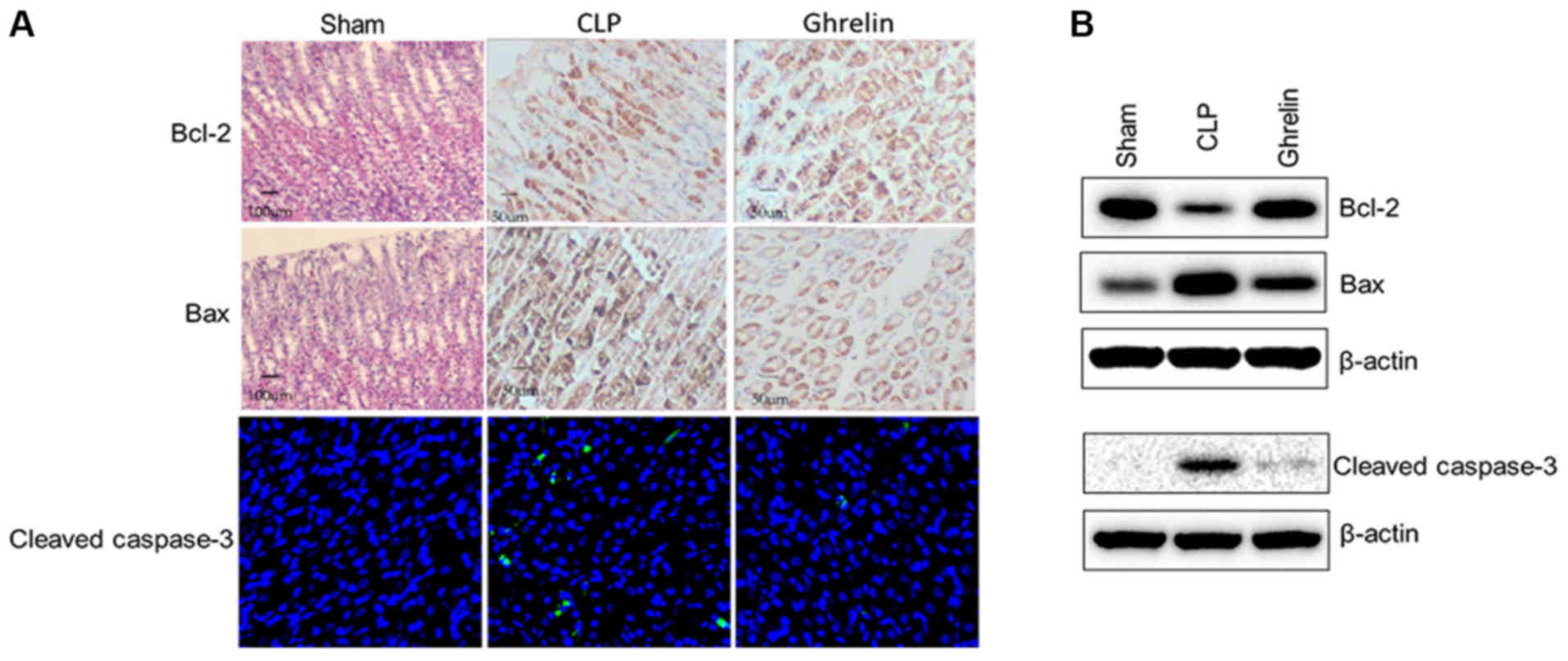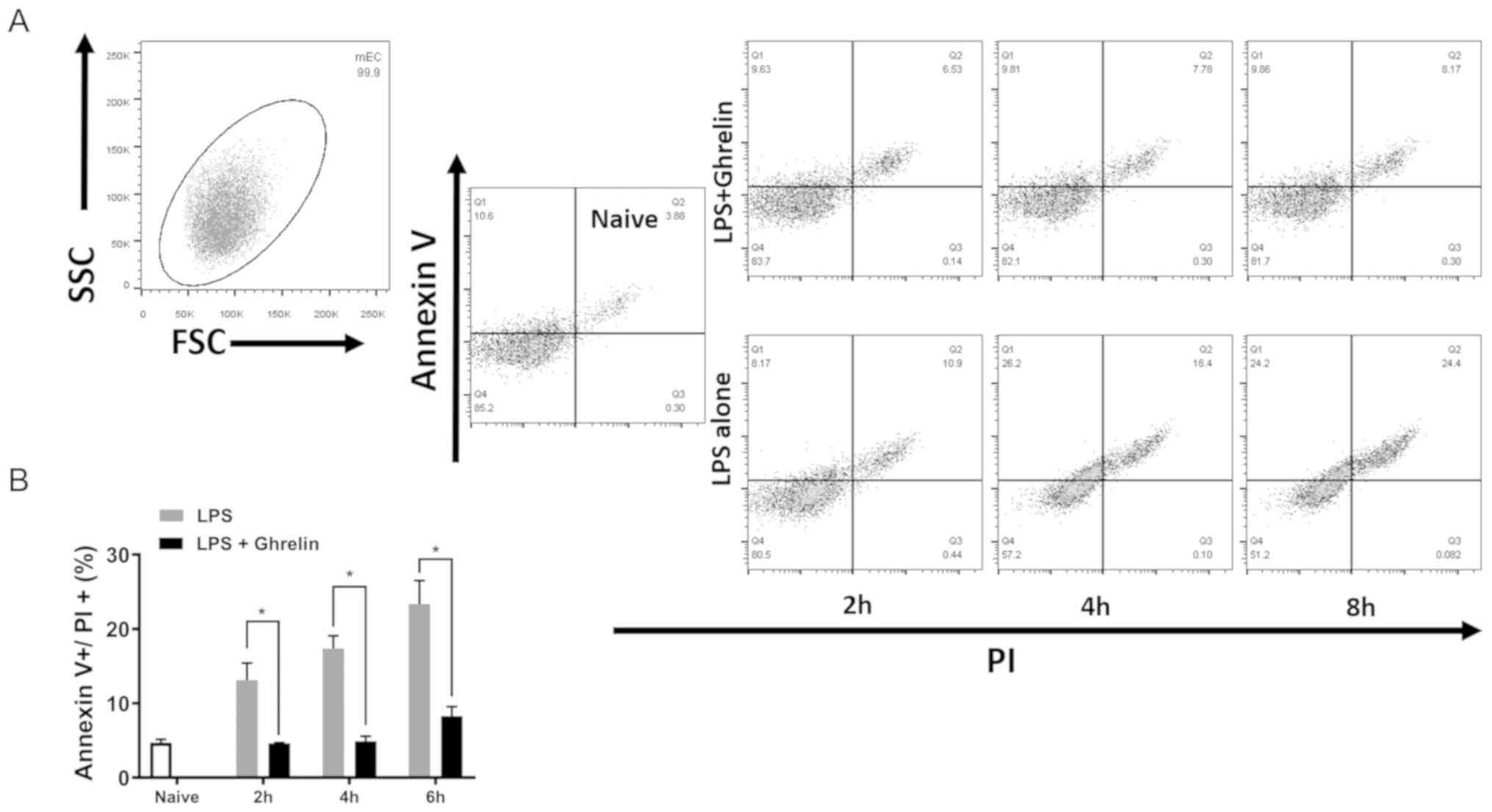|
1
|
Lever A and Mackenzie I: Sepsis:
Definition, epidemiology, and diagnosis. BMJ. 335:879–83. 2007.
View Article : Google Scholar : PubMed/NCBI
|
|
2
|
Martin GS: Sepsis, severe sepsis and
septic shock: Changes in incidence, pathogens and outcomes. Expert
Rev Anti Infect Ther. 10:701–706. 2012. View Article : Google Scholar : PubMed/NCBI
|
|
3
|
Singer M, Deutschman CS, Seymour CW,
Shankar-Hari M, Annane D, Bauer M, Bellomo R, Bernard GR, Chiche
JD, Coopersmith CM, et al: The third international consensus
definitions for sepsis and septic shock (Sepsis-3). JAMA.
315:801–810. 2016. View Article : Google Scholar : PubMed/NCBI
|
|
4
|
Kennelly PJ and Martin-Loeches I: Long
term mortality following sepsis. Ann Transl Med. 4:3872016.
View Article : Google Scholar : PubMed/NCBI
|
|
5
|
Lang CH, Bagby GJ, Ferguson JL and Spitzer
J: Cardiac output and redistribution of organ blood flow in
hypermetabolic sepsis. Am J Physiol. 246:R331–R337. 1984.PubMed/NCBI
|
|
6
|
Moore JX, Donnelly JP, Griffin R, Howard
G, Safford MM and Wang HE: Defining sepsis mortality clusters in
the united states. Crit Care Med. 44:1380–1387. 2016. View Article : Google Scholar : PubMed/NCBI
|
|
7
|
Dashwood AM, Mason R, Jennings C and
Dhillon P: Hepatic portal venous gas with associated bowel
ischaemia and intra-abdominal sepsis after recent chemotherapy. BMJ
Case Rep. 2016(pii): bcr2015213562016.
|
|
8
|
Zhang T, Yang J, Ding C, Li Y, Gu L, Wei
Y, Cao L, Gong J, Zhu W, Li N and Li J: Preoperative
intra-abdominal sepsis, not penetrating behavior itself, is
associated with worse postoperative outcome after bowel resection
for crohn disease: A Retrospective Cohort Study. Medicine
(Baltimore). 94:e19872015. View Article : Google Scholar : PubMed/NCBI
|
|
9
|
Hiltebrand LB, Krejci V, tenHoevel ME,
Banic A and Sigurdsson GH: Redistribution of microcirculatory blood
flow within the intestinal wall during sepsis and general
anesthesia. Anesthesiology. 98:658–669. 2003. View Article : Google Scholar : PubMed/NCBI
|
|
10
|
Albanèse J, Leone M, Delmas A and Martin
C: Terlipressin or norepinephrine in hyperdynamic septic shock: A
prospective, randomized study. Crit Care Med. 33:1897–1902. 2005.
View Article : Google Scholar : PubMed/NCBI
|
|
11
|
Patel BM, Chittock DR, Russell JA and
Walley KR: Beneficial effects of short-term vasopressin infusion
during severe septic shock. Anesthesiology. 96:576–582. 2002.
View Article : Google Scholar : PubMed/NCBI
|
|
12
|
van Haren FM, Rozendaal FW and van der
Hoeven JG: The effect of vasopressin on gastric perfusion in
catecholamine-dependent patients in septic shock. Chest.
124:2256–2260. 2003. View Article : Google Scholar : PubMed/NCBI
|
|
13
|
Janiuk I, Kaleczyc J and Kasacka I:
Ghrelin-immunoreactive cells in the gastrointestinal tract of
hypertensive rats. Folia Histochem Cytobiol. 54:181–185. 2016.
View Article : Google Scholar : PubMed/NCBI
|
|
14
|
Sakata I, Nakamura K, Yamazaki M,
Matsubara M, Hayashi Y, Kangawa K and Sakai T: Ghrelin-producing
cells exist as two types of cells, closed- and opened-type cells,
in the rat gastrointestinal tract. Peptides. 23:531–536. 2002.
View Article : Google Scholar : PubMed/NCBI
|
|
15
|
Sakata I and Sakai T: Ghrelin cells in the
gastrointestinal tract. Int J Pept. 2010(pii):
9450562010.PubMed/NCBI
|
|
16
|
Shao Y, Liu S, Tang X, Gao J, Wu G and Li
Z: Ontogeny of ghrelin mRNA expression and identification of
ghrelin-immunopositive cells in the gastrointestinal tract of the
Peking duck, Anas platyrhynchos. Gen Comp Endocrinol. 166:12–18.
2010. View Article : Google Scholar : PubMed/NCBI
|
|
17
|
Wang JX, Peng KM, Liu H, Song H, Chen X
and Liu M: Distribution and developmental changes in
ghrelin-immunopositive cells in the gastrointestinal tract of
African ostrich chicks. Regul Pept. 154:97–101. 2009. View Article : Google Scholar : PubMed/NCBI
|
|
18
|
Kaplan RC, Strizich G, Aneke-Nash C,
Dominguez-Islas C, Bůžková P, Strickler H, Rohan T, Pollak M,
Kuller L, Kizer JR, et al: Insulinlike growth factor binding
protein-1 and ghrelin predict health outcomes among older adults:
Cardiovascular Health Study Cohort. J Clin Endocrinol Metab.
102:267–278. 2017.PubMed/NCBI
|
|
19
|
Mansson JV, Alves FD, Biolo A and Souza
GC: Use of ghrelin in cachexia syndrome: A systematic review of
clinical trials. Nutr Rev. 74:659–669. 2016. View Article : Google Scholar : PubMed/NCBI
|
|
20
|
Sominsky L, Ziko I, Nguyen TX, Andrews ZB
and Spencer SJ: Early life disruption to the ghrelin system with
over-eating is resolved in adulthood in male rats.
Neuropharmacology. 113:21–30. 2017. View Article : Google Scholar : PubMed/NCBI
|
|
21
|
Zhou D, Jiang X, Jian W, Zheng L, Lu L and
Zheng C: Comparing the effectiveness of total gastrectomy and
gastric bypass on glucose metabolism in diabetic rats. Obes Surg.
26:119–125. 2016. View Article : Google Scholar : PubMed/NCBI
|
|
22
|
Konturek PC, Brzozowski T, Pajdo R,
Nikiforuk A, Kwiecien S, Harsch I, Drozdowicz D, Hahn EG and
Konturek SJ: Ghrelin-a new gastroprotective factor in gastric
mucosa. J Physiol Pharmacol. 55:325–336. 2004.PubMed/NCBI
|
|
23
|
Bilgin HM, Tumer C, Diken H, Kelle M and
Sermet A: Role of ghrelin in the regulation of gastric acid
secretion involving nitrergic mechanisms in rats. Physiol Res.
57:563–568. 2008.PubMed/NCBI
|
|
24
|
Park JM, Kakimoto T, Kuroki T, Shiraishi
R, Fujise T, Iwakiri R and Fujimoto K: Suppression of intestinal
mucosal apoptosis by ghrelin in fasting rats. Exp Biol Med
(Maywood). 233:48–56. 2008. View Article : Google Scholar : PubMed/NCBI
|
|
25
|
Wei C, Louis H, Schmitt M, Albuisson E,
Orlowski S, Levy B and Kimmoun A: Effects of low doses of esmolol
on cardiac and vascular function in experimental septic shock.
Criti Care. 20:4072016. View Article : Google Scholar
|
|
26
|
Chen YK, Xu YK, Zhang H, Yin JT, Fan X,
Liu DD, Fu HY and Wan B: Emodin alleviates jejunum injury in rats
with sepsis by inhibiting inflammation response. Biomed
Pharmacother. 84:1001–1007. 2016. View Article : Google Scholar : PubMed/NCBI
|
|
27
|
Kouno T, Akiyama N, Fujieda K, Nanchi I,
Okuda T, Iwasaki T, Oka S and Yukioka H: Reduced intake of
carbohydrate prevents the development of obesity and impaired
glucose metabolism in ghrelin O-acyltransferase knockout mice.
Peptides. 86:145–152. 2016. View Article : Google Scholar : PubMed/NCBI
|
|
28
|
Miyatake Y, Shiuchi T, Mawatari K, Toda S,
Taniguchi Y, Futami A, Sato F, Kuroda M, Sebe M, Tsutsumi R, et al:
Intracerebroventricular injection of ghrelin decreases wheel
running activity in rats. Peptides. 87:12–19. 2017. View Article : Google Scholar : PubMed/NCBI
|
|
29
|
Zavros Y, Van Antwerp M and Merchant JL:
Use of flow cytometry to quantify mouse gastric epithelial cell
populations. Dig Dis Sci. 45:1192–1199. 2000. View Article : Google Scholar : PubMed/NCBI
|
|
30
|
Zeineldin M and Neufeld K: Isolation of
epithelial cells from mouse gastrointestinal tract for western blot
or RNA analysis. Bio Protoc. 2:e2922012. View Article : Google Scholar : PubMed/NCBI
|
|
31
|
Wu R, Dong W, Zhou M, Zhang F, Marini CP,
Ravikumar TS and Wang P: Ghrelin attenuates sepsis-induced acute
lung injury and mortality in rats. Am J Respir Crit Care Med.
176:805–813. 2007. View Article : Google Scholar : PubMed/NCBI
|
|
32
|
Kojima M, Hosoda H, Date Y, Nakazato M,
Matsuo H and Kangawa K: Ghrelin is a growth-hormone-releasing
acylated peptide from stomach. Nature. 402:656–660. 1999.
View Article : Google Scholar : PubMed/NCBI
|
|
33
|
Shirshev SV, Nekrasova IV, Orlova EG and
Gorbunova OL: Roles of leptin and ghrelin in the regulation of the
phenotype and cytokine production by NK cells from peripheral
blood. Dokl Biol Sci. 470:249–252. 2016. View Article : Google Scholar : PubMed/NCBI
|
|
34
|
Wan SX, Shi B, Lou XL, Liu JQ, MA GG,
Liang DY and Ma S: Ghrelin protects small intestinal epithelium
against sepsis-induced injury by enhancing the autophagy of
intestinal epithelial cells. Biomed Pharmacother. 83:1315–1320.
2016. View Article : Google Scholar : PubMed/NCBI
|
|
35
|
Wu R, Dong W, Zhou M, Cui X, Hank Simms H
and Wang P: Ghrelin improves tissue perfusion in severe sepsis via
downregulation of endothelin-1. Cardiovasc Res. 68:318–326. 2005.
View Article : Google Scholar : PubMed/NCBI
|
|
36
|
Jacob A, Wu R, Zhou M, Coppa GF and Wang
P: Mechanism of the inhibitory effect of ghrelin in sepsis. Hepat
Med. 2:33–38. 2010.PubMed/NCBI
|
|
37
|
Pradhan G, Samson SL and Sun YX: Ghrelin:
Much more than a hunger hormone. Curr Opin Clin Nutr Metab Care.
16:619–624. 2013. View Article : Google Scholar : PubMed/NCBI
|
|
38
|
Diz-Chaves Y: Ghrelin, appetite
regulation, and food reward: Interaction with chronic stress. Int J
Pept. 2011:8984502011. View Article : Google Scholar : PubMed/NCBI
|
|
39
|
Ariyasu H, Takaya K, Tagami T, Ogawa Y,
Hosoda K, Akamizu T, Suda M, Koh T, Natsui K, Toyooka S, et al:
Stomach is a major source of circulating ghrelin, and feeding state
determines plasma ghrelin-like immunoreactivity levels in humans. J
Clin Endocrinol Metab. 86:4753–4758. 2001. View Article : Google Scholar : PubMed/NCBI
|
|
40
|
Yorulmaz H, Ozkok E, Ates G, Aksu A,
Balkıs N and Tamer S: Ghrelin: Impact on muscle energy metabolism
in sepsis. Int J Pept Res Ther. 24:259–264. 2018. View Article : Google Scholar
|
|
41
|
Lyra Junior HF, Rodrigues IK, Schiavon LL
and D Acâmpora AJ: Ghrelin and gastrointestinal wound healing. A
new perspective for colorectal surgery. Acta Cir Bras. 33:282–294.
2018. View Article : Google Scholar : PubMed/NCBI
|
|
42
|
Czabotar PE, Lessene G, Strasser A and
Adams JM: Control of apoptosis by the BCL-2 protein family:
Implications for physiology and therapy. Nat Rev Mol Cell Biol.
15:49–63. 2014. View Article : Google Scholar : PubMed/NCBI
|
|
43
|
Tsujimoto Y: Role of Bcl-2 family proteins
in apoptosis: Apoptosomes or mitochondria? Genes Cells. 3:697–707.
1998. View Article : Google Scholar : PubMed/NCBI
|
|
44
|
An HM, Tan YL, Shi J, Wang Z, Lv MH,
Soares JC, Zhou D, Yang F and Zhang XY: Ginkgo biloba leaf extract
and alpha-tocopherol attenuate haloperidol-induced orofacial
dyskinesia in rats: Possible implication of antiapoptotic
mechanisms by preventing Bcl-2 decrease and Bax elevation.
Phytomedicine. 23:1653–1660. 2016. View Article : Google Scholar : PubMed/NCBI
|
|
45
|
Jiang Z, Liu X, Chang K, Liu X and Xiong
J: Allyl Isothiocyanate inhibits the proliferation of renal
carcinoma cell line GRC-1 by inducing an imbalance between Bcl2 and
Bax. Med Sci Monit. 22:4283–4288. 2016. View Article : Google Scholar : PubMed/NCBI
|
|
46
|
Yorulmaz H, Ozkok E, Erguven M, Ates G,
Aydin I and Tamer S: Effect of simvastatin on mitochondrial enzyme
activities, ghrelin, hypoxia-inducible factor 1α in hepatic tissue
during early phase of sepsis. Int J Clin Exp Med. 8:3640–3650.
2015.PubMed/NCBI
|















